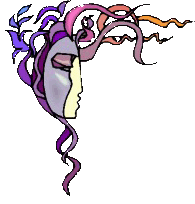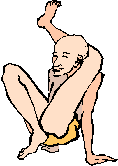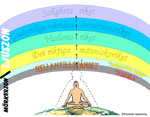Possession - Superstition or Reality?
 Marja
Marja  2013-02-22 18:34, author Marja
2013-02-22 18:34, author Marja
The symptoms, that these people have are almost all the same, no matter which the method they have adopted:
- Confused thoughts, difficulties in making out the difference between what is real or unreal.
- Lack of presence. The person submerges into an own world.
- Difficulties in perceiving the limits of the body, one feels that one is "skinless".
- Fear. Anguish. Horror. Chaos.
- Paranoia.
- Agression
- Suspicion.
- A feeling that one is controlled by outer or invisible forces.
- Hearing voices saying that the person is chosen and has a great mission to do on earth.
- Having visions; people distort, colours change or disappear.
- A feeling that the thoughts of others "jump on" one's own.
- A tendency to misunderstand.
- A idea that, in the middle of all this one is a very important person, with great responsibility, like Jesus, the Virgin Mary or some other spiritual Master of high standing.
These people oscillate between being manic and depressed.
One woman who was in the phase of depression expressed her lack of the manic phase, as feeling like God had left her. When she was manic she, among other things, danced around naked even though she was visited by her family or friends. These had more and more withdrawn and she felt very lonely. When she submerged into depression, the voices could tell her to walk straight out into the sea and drown herself. But still, she did not want to get rid of these voices. Her view of her condition was, that she did not think she was ill, and that it is only here in the west that we are considered ill and get locked up. If she had lived in India, she would have been treated with respect and honour, since she was "glorified by God", she thought. She was repeatedly admitted into a psychiatric clinic.
These people can no longer work. They become passive, find it difficult to concentrate, lack endurance and get problems with their memory. The feeling of meaninglessness causes them to loose the will and desire for life. A feeling of loneliness, powerlessness and emptiness does that they isolate themselves from the world around. They become drained of energy. Some do not at all have the opinion that they are sick, while others are aware they have "noise" around them, and feel a cold draft of invisible creatures around. The last mentioned are the ones who sometimes seek help on their own. Within psychiatry, they are most often diagnosed psychotic or schizophrenic.
The symptoms are actually exactly the same of a psychotic or schizophrenic person, and a person who has become ill due to spiritual exercises.
According to psychiatry the causes of psychosis and schizophrenia are considered to be:
- heritage
- brain-damage (infections, lack of oxygen arisen before, during or after the delivery)
- psychological and psycho-social factors
The fact that it should all be about people with split souls, who appear with a whole set of personalities and undergo a transformation from being one to being another, is considered by many within the psychiatric care to be a media myth.
Others, on the other hand, like the American psychologist Edith Fiore, writes in her book "The unquiet dead", that up to 70% of her patients are more or less possessed. She discovered by chance, during a hypnosis-treatment, that she spoke to a possessing spirit, and not to the unconscious of the patient. She discovered that these possessing spirits were not "demons", but unhappy homeless discarnated (deceased) souls, trapped in an intermediate state. Various bonds, like hate, love or abuse, kept them trapped in the earthly sphere. We can invite these souls into our consciousness; and it is especially common with possessing spirits due to alcoholism. (Listen to Edith Fiore)
In his book "Return from tomorrow" George G. Ritchie, tells about his near-death experience, during which he was guided to different places by a being, who he interpreted as Jesus.
He tells that he was taken to a dirty bar where a lot of people stood drinking. Some knocked back drinks as fast as the sweaty bartender was able to serve them.
All of a sudden, he discovered something that surprised him.
Some of the men at the bar, seemed not to be able to lift their drinks. Their hands passed straight through the glasses, and also through the bodies of the men standing at the bar gulping down drinks. All these men lacked the circle of light, that surrounded the others who drank. He understood that the aura of light only existed by those who were alive, while the "dead" had lost this "second skin". These "dead" people argued furiously about the glasses, which they tried unsuccessfully to lift.
Then, he saw a sailor, who had drunk too much, get up from his chair on unsteady legs, only to drop to the ground after a few steps. Some comrades started to drag him away from the crowd. Astonished Richie saw how the aura of light around the unconscious sailor simply opened up. It split up and started to disappear from the head and shoulders. Quickly, faster than he ever had seen somebody move, the spiritual creature jumped on him. In the next moment, the character had slid into the aura and disappeared, to George Ritchies big surprise. He saw the same thing happen to two other men in the bar.
These experiences left him with questions. Was that envelope of light some kind of protection we have, he wondered, also against spiritual creatures? And could it be, that an addiction was mental in nature, and did not disappear when you became cut off from the physical world? What if there was a kind of invisible hell on earth, unknown to those still living on it. What if it meant being left on earth, but never again being able to get into contact with it?
In Tibet, which is considered by many to be the chosen country of secret doctrines and supernatural knowledge, the risk of being possessed has been a well known fact.
Maybe no westerner has come closer to the Tibetans than Alexandra David-Néel. She travelled around incognito in Tibet, disguised as a poor pilgrim when Tibet still was a closed country, in the beginning of the 20th century. She learned their language and culture. She eventually became so accepted that she could explore the secret doctrines and obtained permission to train under the lamas, and later she, herself, became a lama. In her book "Mystiques et magiciens du Tibet" one can read the following:
According to the Tibetans there were two paths to enlightenment.
One was a peaceful life in the monastery where one obeyed moral commands and monastery rules, i.e. behaving impeccably, doing good deeds, disregarding material interests and striving for peace of mind. In this way one could eventually reach salvation.
The other path was called the "direct way" and was a purely intellectual method, which freed the one who followed it from all kinds of laws. One could reach this freedom through artificial spiritual exercises, like breathing-exercises, yoga and meditation. But that path was considered to be highly dangerous. It was like, instead of following the path which slowly winds its way up towards the top of the mountain, trying to climb vertically up the cliffs and cross abysses with help only of a thin rope. Even the best suited for it could be hit by a sudden attack of dizziness and fall like a presumptuous alpinist and break his back. By this the Tibetans mean a terrible spiritual fall which leads to the worst kind of perversities and the greatest confusion. One landed in the end on a "demonic" level. Instead of reaching "the total liberation" they became mad. They had knocked on doors which they should not have done.
Not even in the old occult Tibetan literature can one find the perfect doctrine about these exercises, they were given only verbally from master to disciple, and the interpretations varied not only from sect to sect, but also from master to master. (In the "Tibetan Book of the Dead", which can be read as a "process of initiation", the aspirant is warned against "following the dim lights" in the kingdom of the dead, on the spiritual path. The dim lights come from the World of the Unhappy Spirits and one does not succeed in reaching Liberation if one gets stuck there.)
The Tibetans thought that one can train one's capacity of thinking and thus create all kinds of animals, things, landscapes, "gods" and phantoms, since everything is based on the power of mind. They thought they could tame these "demons" and "gods" and force them into obedience and keep them trapped and then use them for their own purposes. But, if one lost control over the "demon" this could turn against his master and drive him mad, and even drive him to commit suicide.
Sceptic as she was, Alexandra David- Néel wanted to experiment herself. She choose to create a modest, stocky, and corpulent lama of the good-natured type.
After some months the man had taken form, and to her he became a kind of guest. But he eventually did not even wait for her thinking of him before he had permission to appear; he appeared also when she was busy thinking of other things. She experienced him visually, but sometimes she could feel as if she touched his coat, and had also the feeling of his hand being put on her shoulder. She writes:
"A gradual change occurred with my lama. The features I had given him were modified, his plump character grew thinner and there became something vaguely ironic and mean about him. He got more and more troublesome. In short, I had lost control over him. [...] this bizarre presence started to get on my nerves. It was about to change into a nightmare. I decided to dissolve this hallucination which I did not fully master. I eventually succeeded, but it took me six months of efforts. My lama was tough." (Translated from the Swedish version)
There are similar thoughts in the Egyptian culture, and the "demons" were called "djinns", and are considered to be creatures who are not human but have been born directly into the spiritual world. A magician can evoke and tame a "djinn", but if he looses the power of him, the "djinn" can attack and take control over the man. He then has lost control of his life, becomes mad, and death can be the result.
Now, is all this only old superstition and blind faith? Is it something that arises from the depth of man's own unconscious, as some people assert?
No, Martinus says, a Danish man who got cosmic consciousness in 1921, and has written down his cosmic analyses in his work, the Third Testament, Livets Bog (The Book of Life).
"Possession can occur and is often an essential factor in the cause of crimes, murder and homicide. In such cases where a misdeed is due to possession, the criminal cannot afterwards account for his wicked deed. He has practically been in a kind of half-trance. He can only remember that he was seized by an irresistible desire to commit the crime. Since science of today is not yet developed enough that it can prove possession as a cause, it is sometimes described as a sudden 'outburst of insanity'." (Kosmos 10/90 "How does one avoid getting possessed?")
Alcoholics and drug abusers are often surrounded by one or more possessing creatures, which can be seen with clairvoyant vision, since our addictions do not disappear when we "die", but the thoughts and desires we have, follow us to the spiritual plane, he says.
Other areas where there is great risk of attracting discarnated (deceased) creatures, are where one, in one way or another, looses control, as by:
 trance and hypnosis
trance and hypnosis- during outbursts of anger
- incorrect meditation
- yoga
- automatic writing, channeling , dowsing
- spiritism
- extreme tiredness
- all spiritual exercises, where one in some way tries to go beyond the boundary with the spiritual world.
The causes of possession can be many, but are for the most part due to an earthly bond by the discarnated being.
There are no "demons" according to Martinus, but everyone who exists on the spiritual plane has at sometime existed on our physical plane.
Those who die are not all saints, and it is their mentality of dark thoughts like hate, anger, bitterness, jealousy, grudging, anguish, depression, the desire to own other beings or things, the lust for power and other negative thoughts and bonds that keep them trapped in an intermediate state. This is the spiritual plane which vibrates closest to our own, and from which all dark possession can be released. Possession is a kind of spiritual rape - the will of a more powerful being conquers the will of a weaker being. It can become so strong that the weaker being turns into an instrument, with no will of his own.
We have two kinds of consciousness according to Martinus.
One is our day consciousness, with which we experience the time of day when we are awake. The other he calls night consciousness, and it is not difficult to guess that it is our sleeping state he means. It is during sleep that we stay in the spiritual world and we can then also in a natural way be in contact with deceased family members and friends, although mostly we do not remember it in the morning. But this night consciousness is to be developed, and will in the future become something that he calls mental day consciousness. It is this consciousness one can force oneself into by meditation, yoga, mediumism and other kinds of spiritual exercises. It is the same as trying to trespass into a world, for which we do not yet have senses, and cannot orient ourselves in. And the first ceiling that one hits the head of one's consciousness on, is exactly this first sphere that Martinus calls the intermediate state, which also has been called "purgatory". It is the residence of those who have not yet realised that they are "dead", and are not yet inclined to let go of their thoughts filled with hatred and darkness.
The intermediate state has another plane, where those come who have become tired or passed beyond the mentality of the first plane. These people have prayed for help and thus with help of the guardian angels are "purified" and then are guided on into a paradise area in the intermediate state.
There are also higher states but from these light zones no possession can be triggered, since power over someone else's will is totally alien to these beings of love who dwell on these planes. Click on the picture to be enlightened!
 Other risks are according to Martinus, if one too often trespassse into the current night consciousness or the future mental day consciousness in an unnatural way through artificial exercises, so that one in the end can no longer stay in the physical world but instead gets detached and the boundaries between the physical and the spiritual worlds get erased. The individual mixes everything together and becomes confused. We still lack the ability to analyse what we get into contact with on the spiritual plane.
Other risks are according to Martinus, if one too often trespassse into the current night consciousness or the future mental day consciousness in an unnatural way through artificial exercises, so that one in the end can no longer stay in the physical world but instead gets detached and the boundaries between the physical and the spiritual worlds get erased. The individual mixes everything together and becomes confused. We still lack the ability to analyse what we get into contact with on the spiritual plane.
Vanity and pride, which are the final characteristics to leave our mentality, are the guardians of the threshold according to Martinus. It is these characteristics in the individual that make her/him believe in the spirits who whisper in the ear of the person in question, saying that they will receive insights into the great Truths, and that they are chosen and have a great mission to do on earth. And they think that they are highly developed individuals, yes, sometimes even a newly incarnated Jesus or Virgin Mary.
Our aura is the protective suit we carry and, according to Martinus, it is only protective to the extent to which we protect others. And if there are dark spots or holes in the aura, one can, without knowing it, open oneself up to discarnated beings, if one lets go of the control over one's thoughts or one's consciousness.
To sit and repeat unknown mantras, then, that one has got without knowing what one rattles off, can be disastrous: one doesn't know who one invites into one's dwelling!
But no one can be possessed against their will, Martinus writes, and it can only happen if, as I have previously mentioned, one lets go of control and is not "Master of one's own house".
Martinus writes:
"Our road to initiation is not some gift of grace one is awarded through the sympathies or tokens of favour of other beings, and neither is it some kind of magic trick or hocus-pocus one can use by being a member of some mystic, magic or occult school or circle" (Livets Bog VI, 2005-7)
The only way is solely that which goes from selfishness towards unselfishness, which means that one has not come here to be served, but to serve, he writes. That is what the Indian people call karma-yoga and which has been forgotten on the "new-age" spiritual market.
If one practices daily treating one's neighbour in the way one would like to be treated oneself, one walks the safe road towards the light and does not need to risk, either being possessed or being hit by other negative side effects on the spiritual road.
Copyright Marja S 1997. All rights reserved.






